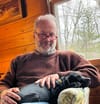Walking on Ice
It is a superior feature of winter to be able to step onto a frozen pond or lake, and we have many of them. It is liberating.

I fell through a thin patch of ice close to shore that must have been healing over after a beaver punched an exit. On balance, the ice on the pond where we live is several inches thick following the frigid temperatures of the last month. But there are a few spots where runoff from the hills is active all year that the beavers seem intent to keep open for foraging. Their tail tracks are obvious in the snow. And it is a curious thing how those tracks will sometimes dead end in the middle of the pond, where there is no possible way one has come up through the ice and there is nothing out there to drag home. It suggests they get that far and change their mind. Although I would expect to see evidence of a retreat going right or left indicating they turned back to shore. Instead, the track just ends. Picked up by helicopter, maybe. Or drone. Commando beavers.
Whatever, clearly, I was not alert to traces of their activity when my left snowshoe fell through. Not deep. Maybe a foot of water, five or ten yards from land. I lost the shoe in the muck, so I had to sit down—carefully, so as not to cave-in more ice—and fish with my ski pole to retrieve it. Afterward, I trudged the short distance home with a cold, wet boot.
It had been a beautiful walk around the pond none-the-less, about a mile-and-a-half if my Apple watch is accurate. While I circumnavigated, my trusty walking companion, Huckleberry, bounded ahead, darting into the woods, popping out at a distance, racing back for a cookie to keep up his strength.
It is a superior feature of winter to be able to step onto a frozen pond or lake, and we have many of them. It is liberating. The rest of the year we must rely on boats or snorkels, reminding us of our limitations. Paddle in summer or walk in winter to the same spot on a pond to embrace the view of hills rising at the far end, and I believe you will acknowledge the experience is different, apart from the cold or snow. Being there without the benefit of man-made contraptions is like having a temporary pond pass that reads, Admit User Backstage.
It means the ability to poke into the nooks and crannies of the pond that are inaccessible the rest of the year because the water is too shallow and bog-like, or thick with bramble, with no good place to park a canoe. Along our stretch of shoreline, it means easy access to high growth blueberry bushes we keep pruning. I tried reaching them one spring wearing blue jeans, a long sleeve shirt and high boots to protect myself from the emerging undergrowth and swampy conditions and wound-up stepping on an underground nest of bees. I’ll start on them in another few weeks from the frozen water’s edge with a Yeti thermos of decaf—or something— by my side.
In the meantime, the grandchildren are planning to be here for the long weekend. They have been taking skating lessons back home, so we are grooming an ice rink. A few days of warmer weather, maybe even a little rain, then cold, would help. The forecast offers the possibility of meeting those requirements.
We play hockey. Everyone against the dog, who speeds and slides across the surface after the puck. If he gets it, he buries it the woods. So the stakes are high. Last year, Huck recognized the advantage of covering our four-year-old grandson, which smoothed his road to victory after successfully retrieving and decommissioning three pucks. The four-year-old will not be on the ice this year because of previous commitments, though we could benefit, as always, from his enthusiasm. Frankly, he appeared to take as much delight in Huckleberry’s successes as our own, which helped everyone go away happy.

